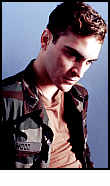
Joaquin Phoenix is an Army clerk and drug dealer in 'Buffalo Soldiers.'
Joaquin Phoenix is no stranger to drug controversy.Almost 10 years ago, before he was well known for his acting, the world knew his voice from the wrenching 911 call he made as his brother, actor River Phoenix, lay dying of a drug overdose outside an L.A. club. The tape was played over and over on news reports.
Now, with a new leading role, the 28-year-old actor is in the headlines again. His new film, "Buffalo Soldiers," opening Friday, has been criticized for its depiction of soldiers engaging in - of all things - drug use.
In the film, Phoenix plays Ray Elwood, a reluctant clerk at an East German military base in 1989. As the Cold War thaws, Elwood dabbles in illegal arms sales and cooks up heroin to make a profit behind the back of his superior (Scott Glenn), who's also the father of his sexy girlfriend (Anna Paquin).
Phoenix refuses to answer questions about River - he has had to deal with it throughout his career and all he says now in any interview is he's proud of River and doesn't want to be compared with him.
Still, when he talks about "Buffalo Soldiers," it's easy to see the drug subplot caused him deep thought.
"Making a movie is a combination of honesty and fiction, mixing what's real and what's fabricated," he says. "I wanted to know that the events in 'Buffalo Soldiers' were based in reality."
After that, he says, what's difficult is "maintaining a consistent emotion as you film over several months, when your personal life may [change]."
Almost since it was completed in summer 2001, "Buffalo Soldiers" has been affected by world events. The movie was bought by Miramax at the Toronto Film Festival the night of Sept. 10, 2001. A day later, it's sly, "M*A*S*H"-like tone seemed inappropriate after the terrorist attacks.
Miramax held the film as U.S. forces invaded Afghanistan. As war with Iraq neared, the movie's tone became an issue, and as its release date neared, radio hosts and Internet columnists said the film was disrespectful.
"My character had no element [of sympathy] in the screenplay," Phoenix says, "and I thought that was brave - and scary too, because you run the risk of people hating you. I liked the challenge."
Phoenix was born in Puerto Rico to ex-missionary parents who fled with their five children from a commune in South America after discovering it was a cult. Growing up as pseudo-hippies, the Phoenix children sang in the street for money until their mother got them a Hollywood agent. Joaquin quit school to follow River into show business, getting TV and movie roles using the name Leaf Phoenix.
Phoenix's haunting performance as a high school burnout obsessed with a TV weathergirl (Nicole Kidman) in 1995's "To Die For" made him more than just River's brother. He followed it with "Inventing the Abbotts."
Phoenix's quietly seething turn as the young emperor Commodus in 2000's "Gladiator" (he gets "vexed, terribly vexed" by Russell Crowe's heroic Maximus) earned him an Oscar nomination for Best Supporting Actor.
In "Gladiator," "Joaquin brought an incredible sense of sorrow and pathos and loss to what could have been a cartoon villain. It made that movie Shakespearean," says director James Mangold, for whom Phoenix will play Johnny Cash next year in "Walk the Line."
Despite its plot, "Buffalo Soldiers" required less intensity.
"'Gladiator' and 'Quills' [in which he played a sanatorium priest who befriends the Marquis de Sade] required a lot of research," Phoenix says. "Here, I needed to stay loose."
He rolls up his pant leg to display a tattoo on his ankle: a sneering bee wielding an ax, the symbol of the Baltimore firetruck company Phoenix hung out with while making "Ladder 49," due in November.
He says he can connect with firefighters' sense of isolation.
"When I'm working, I find it difficult to relate my story, my experiences, because it's a world unto itself," he says. "All they really have is each other."
Originally published on July 22, 2003